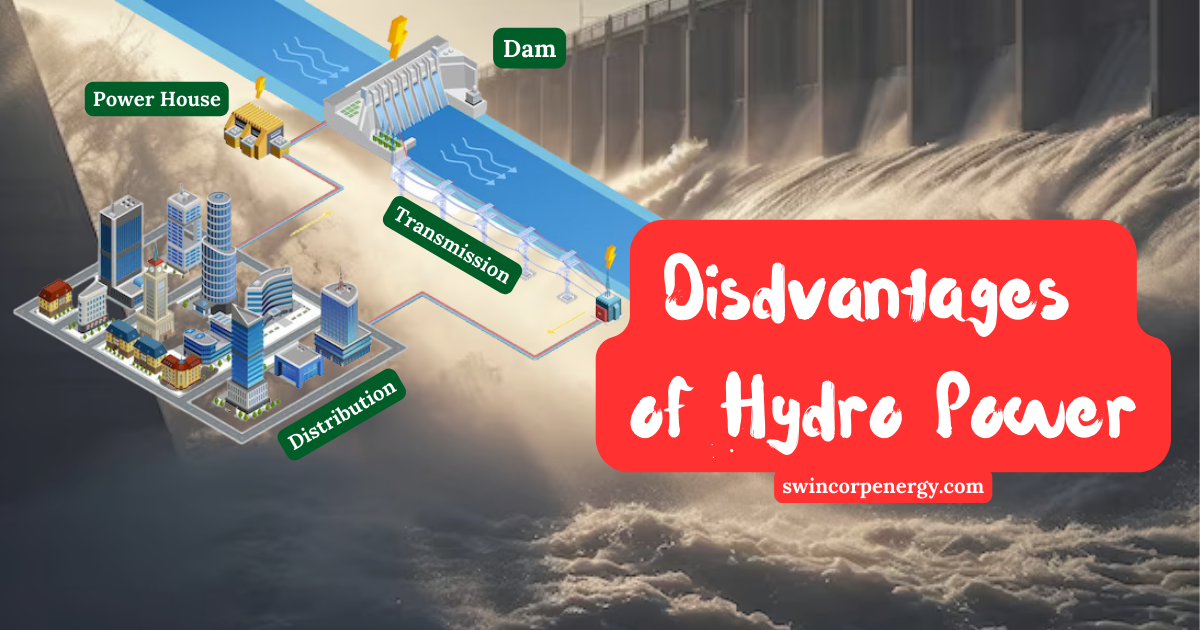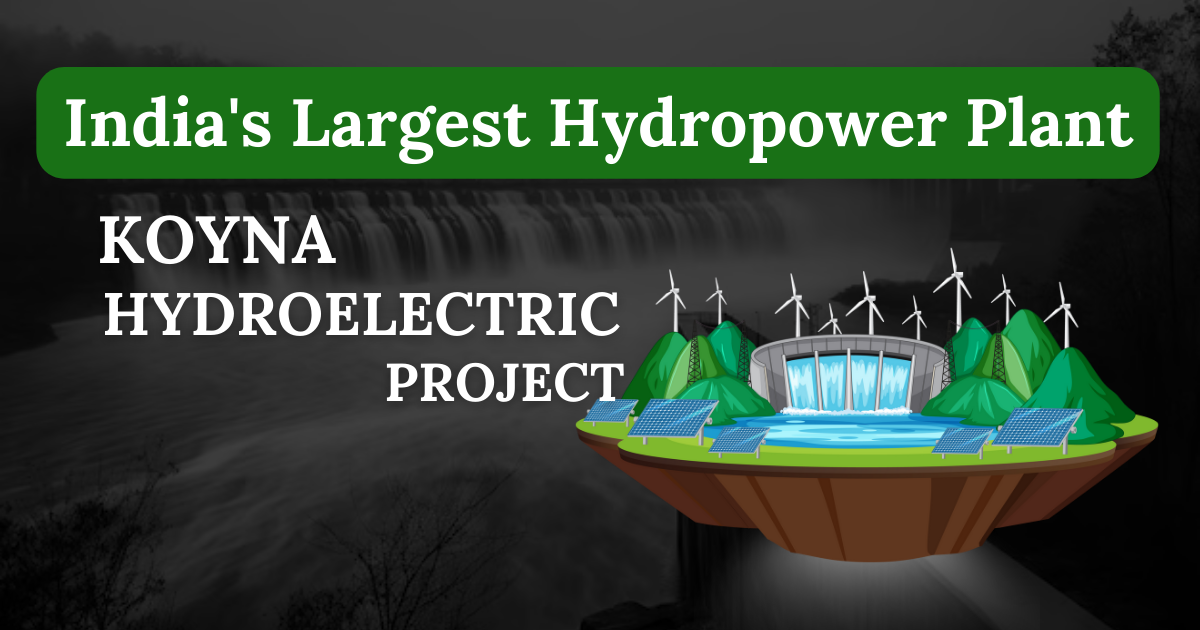Hydropower Pros Cons
Working of Hydropower:
Hydropower works by converting the energy of falling water into electricity. This is done by using a turbine, which is a device that rotates when it is acted upon by water. The turbine is connected to a generator, which converts the rotational energy of the turbine into electrical energy.

The Disadvantages of Hydropower
It is a clean and efficient source of energy, but it also has some disadvantages.
- Environmental impact
One of the biggest disadvantages of hydropower is its environmental impact. Dams can disrupt the natural flow of rivers, which can harm fish and other wildlife. They can also flood large areas of land, displacing people and wildlife. - Methane emissions
When plants and animals die in reservoirs behind dams, they release methane, a greenhouse gas that is more potent than carbon dioxide. This can contribute to climate change. - Limited plant locations
Hydropower plants can only be built in places with a lot of running water. This limits the number of potential sites for hydropower plants. - High initial cost
Hydropower plants are expensive to build. This can make it difficult to finance them, especially in developing countries - Droughts and flooding
Hydropower plants are susceptible to droughts and flooding. If a river dries up, the plant will not be able to generate electricity. Flooding can also damage hydropower plants and infrastructure. - Safety concerns
Dams can fail, which can cause catastrophic flooding. This is a major safety concern, especially for dams that are located near populated areas. Despite these disadvantages, hydropower is still a valuable renewable energy source. It can help to reduce our reliance on fossil fuels and combat climate change.
RELATED POSTS:
- Disadvantages of Hydropower
- Is India Ready for Electric Vehicles ?
- Best Rooftop Solar Panels For Home
- Best Solar Lights for your Home
- What is Solar Desalination?
- Choose the Best Solar Inverter
- JSW Energy Share Price
- Solar Mounting Structures
- Advantages of Nuclear Energy
- G20 Summit Countries
- Choose the Right Battery Energy Storage
- How Hydropower Plants Work ?
other disadvantages of hydropower that are worth mentioning:
- Disruption of cultural heritage: Dams can flood archaeological sites and cultural heritage, such as ancient temples and villages.
- Social impact: Dams can displace people and communities, and they can also lead to conflict between different groups of people.
- Economic impact: Dams can have a negative impact on the local economy, such as by reducing tourism or agricultural production.

Advantages of Hydropower
- Environmentally friendly
Hydropower is a clean energy source that does not produce greenhouse gas emissions. This makes it a valuable option for reducing our reliance on fossil fuels and combating climate change. - Reliable and affordable
Hydropower is a reliable source of energy that can be used to generate electricity on demand. It is also a relatively affordable source of energy, making it a cost-effective option for many countries. - Scalable
Hydropower plants can be built to generate a wide range of electricity output, making them a versatile option for meeting the needs of different communities. - Sustainable
Hydropower is a sustainable energy source that can be used for centuries to come. The water that is used to generate electricity is not consumed, but rather returned to the environment.
Other advantages
In addition to the above, hydropower also has other advantages, such as:
- It can help to mitigate flooding.
- It can provide water for irrigation and drinking.
- It can create recreational opportunities.
- It can boost the local economy.
Overall, hydropower is a valuable renewable energy source that has many advantages over other energy sources and comparatively disadvantages of hydropower are very less. It is a clean, reliable, affordable, scalable, and sustainable source of energy that can help us to reduce our reliance on fossil fuels and combat climate change.
Join whatsApp Channel
hydropower pros and cons,hydropower disadvantages,pros and cons of hydropower,benefits of hydropower,advantages of hydropower, Environmental impact, Dam construction disruption, Habitat destruction, Water flow alteration, Fish migration disruption, Reservoir methane emissions, Downstream water depletion, Community displacement, Land acquisition conflict, High initial construction costs, Dependence on rainfall and droughts, Limited geographical suitability, Potential for safety hazards, Water quality changes, Sedimentation buildup, Cumulative ecological impact, Social and cultural disruption, Indigenous rights concerns, Tourism and recreation losses, Alternative energy competition.


Is India Ready for Electric Vehicles - swincorp
[…] India’s Power Sector Analysis Disadvantages of Hydropower […]
Best Rooftop Solar Panels for Your Home: Complete Guide - swincorp
[…] Disadvantages of Hydropower […]
JSW Energy Share Price: What to Expect in 2023 - swincorp
[…] Disadvantages of Hydropower Is India Ready for Electric Vehicles ? […]
G20 Summit 2023: A Turning Point for the Global Economy - swincorp
[…] Disadvantages of HydropowerIs India Ready for Electric Vehicles ? […]
Top 5 Best Solar Lights for Your Home | Swincorp Energy - swincorp
[…] Disadvantages of Hydropower […]
The Rise of Wind Energy in India | Swincorp Energy - swincorp
[…] Disadvantages of HydropowerIs India Ready for Electric Vehicles ? […]
India's Largest Hydropower Plant : Koyna Hydroelectric Project - Swincorp Energy
[…] Disadvantages of HydropowerIs India Ready for Electric Vehicles ? […]
A Guide to Solar Inverters - Swincorp Energy
[…] Disadvantages of Hydropower […]
Advantages of Geothermal Energy - Swincorp Energy
[…] Disadvantages of Hydropower […]
Suzlon Share Price - Swincorp Energy
[…] Disadvantages of HydropowerIs India Ready for Electric Vehicles ? […]
Solar Panel Manufacturing: Process, Production Stages - Swincorp Energy
[…] Disadvantages of Hydropower […]
Solar Panel Efficiency And Performance Metrics - Swincorp Energy
[…] Disadvantages of Hydropower […]
cheapest electric cars for sale
Hi there, just became alert to your blog through Google, and found that it is truly informative.
I’m going to watch out for brussels. I’ll be grateful if you continue this in future.
Lots of people will be benefited from your writing. Cheers!
showbiz
always i used to read smaller content that
also clear their motive, and that is also happening with this article which I am reading at this time.
How Does Wind Energy Work : Free Complete Guide - Swincorp Energy
[…] Disadvantages of HydropowerIs India Ready for Electric Vehicles ? […]
Maruti Brezza CNG: Mileage, Review, Features - Swincorp Energy
[…] Disadvantages of Hydropower […]
Tata Punch EV: Best Electric SUV under 15 Lakhs - Swincorp Energy
[…] Disadvantages of Hydropower […]
qfExJMOvsWAhZNaL
zYgTJBpaDkSq